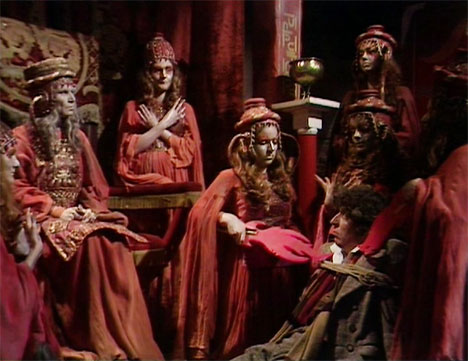Crawling with Priestesses
 From Douglas Wilson’s Why Ministers Must Be Men:
From Douglas Wilson’s Why Ministers Must Be Men:
Any discussion of women’s ordination will obviously revolve around the direct Pauline statements on the subject, and we will certainly spend the lion’s share of our space there. However, the Pauline instructions were not delivered in a vacuum and when he makes his appeals outside his immediate situation, he makes those appeals to the Old Testament, ground his appeals in both the history recorded there and the law given there.
It is a commonplace assertion among feminists that the Bible is a partriarchal book, and this is usually said like it is a bad thing. Value judgments aside, this would seem to be correct. The patriarchs of Israel are Abraham, Isaac, and Jacob, all men. Jacob, renamed as Israel, had twelve sons who become the progenitors of the twelve tribes. In the entire history of Israel, there was only one queen who ruled apart from a king and she was a usurper and a tyrant (2 Kings 11:1). From Aaron, the first high priest in Israel, down to the last priest when the Temple was destroyed in 70 AD, all were men. There were a number of prophetesses, who will be discussed in detail later; but Deborah was the only one who also ruled in a civil capacity, and she appears to have done so in her capacity as a prophetess (Judg. 4:4). The general assumption was that women ruling was a sign of judgment (Is. 3:12).
When Jesus came to establish the new Israel, he did so by gathering twelve disciples around himself (Luke 6:13), clearly declaring that he was reorganizing Israel, reconstituting it; and he did this by appointing twelve men. This is not because there were no available women—he had influential and talented women that he could have picked, but he did not (Luke 8:3). If it was time to overhaul Israel (and it was), why did Jesus not include women in the company of the twelve apostles?
So when Jesus set himself to establish Israel again, gathering a new Israel and organizing it around himself, he picked twelve apostles, all of them men. Just as Moses had the Tabernacle at the center of the camp, with the tribes encamped around, so the Lord took the place of that Tabernacle and gathered his disciples around. The new twelve tribes had masculine leadership, just as they always had. If the New Covenant was going to be the time to make a decided break with the old, outmoded, patriarchal ways, this would have been a good time to do it. But Jesus did not—why?
The fact there were no priestesses in Israel (and no women apostles) incidentally answers a common objection on this subject, and does so in passing. It is easy for objectors to say that the reason Christian women were not allowed to become religious ministers back in the “olden time” was because the position of women in society back then would have made the Christian faith disreputable to outsiders if women were allowed to function in this way. Inside the church, the truth of emancipation was acknowledged (Gal. 3:27-29), but for the sake of evangelizing outsiders, adjustments were made for the time being. Now that we all know better, it is safe for Christians to come out and say what we really thought all along.
The problem with this argument is that it is actually the reverse of the truth. The Christian church did not have to exclude women in order to fit in. Excluding women from the ministry was the odd thing to do. The ancient world was crawling with priestesses, and if Christians had admitted women into their ministry, no one would have raised an eyebrow. The church took the counter-cultural route and did something that made her stand out — which is, incidentally, what we are being called to do…
…our neo-pagan age is at home with the Great Mother, just as ancient paganism was. And there is no way to reject this resurgent paganism without rejecting the principal form that it takes, which is that of feminine ministry.
Camille Paglia has a skewed view of a lot of things, but there are some things she sees quite clearly. “The book of Genesis is a male declaration of independence from the ancient mother-cults. Its challenge to nature, so sexist to modern ears, marks one of the crucial moments in western history … The mother-cults, by reconciling man to nature, entrapped him in matter.”

























